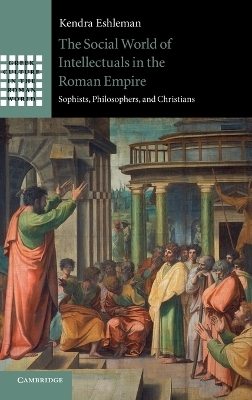
The Social World of Intellectuals in the Roman Empire
Sophists, Philosophers, and Christians
Seiten
2012
Cambridge University Press (Verlag)
978-1-107-02638-4 (ISBN)
Cambridge University Press (Verlag)
978-1-107-02638-4 (ISBN)
Explores how social networks shaped the identity of sophists, philosophers, and Christians in the early Roman Empire. Taking a sociological focus, this book redresses a bias toward intellectual concerns, enriches understanding of the Second Sophistic and reframes the formation of Christian 'orthodoxy'.
This book examines the role of social networks in the formation of identity among sophists, philosophers and Christians in the early Roman Empire. Membership in each category was established and evaluated socially as well as discursively. From clashes over admission to classrooms and communion to construction of the group's history, integration into the social fabric of the community served as both an index of identity and a medium through which contests over status and authority were conducted. The juxtaposition of patterns of belonging in Second Sophistic and early Christian circles reveals a shared repertoire of technologies of self-definition, authorization and institutionalization and shows how each group manipulated and adapted those strategies to its own needs. This approach provides a more rounded view of the Second Sophistic and places the early Christian formation of 'orthodoxy' in a fresh context.
This book examines the role of social networks in the formation of identity among sophists, philosophers and Christians in the early Roman Empire. Membership in each category was established and evaluated socially as well as discursively. From clashes over admission to classrooms and communion to construction of the group's history, integration into the social fabric of the community served as both an index of identity and a medium through which contests over status and authority were conducted. The juxtaposition of patterns of belonging in Second Sophistic and early Christian circles reveals a shared repertoire of technologies of self-definition, authorization and institutionalization and shows how each group manipulated and adapted those strategies to its own needs. This approach provides a more rounded view of the Second Sophistic and places the early Christian formation of 'orthodoxy' in a fresh context.
Kendra Eshleman is an Assistant Professor of Classical Studies at Boston College.
Introduction; 1. Inclusion and identity; 2. Contesting competence: the ideal of self-determination; 3. Expertise and authority in the early church; 4. Defining the circle of sophists: Philostratus and the construction of the Second Sophistic; 5. Becoming orthodox: heresiology as self-fashioning; 6. Successions and self-definition; 7. 'From such mothers and fathers': succession narratives in early Christian discourse.
| Reihe/Serie | Greek Culture in the Roman World |
|---|---|
| Zusatzinfo | 2 Line drawings, black and white |
| Verlagsort | Cambridge |
| Sprache | englisch |
| Maße | 152 x 229 mm |
| Gewicht | 620 g |
| Themenwelt | Geschichte ► Allgemeine Geschichte ► Vor- und Frühgeschichte |
| Geschichte ► Allgemeine Geschichte ► Altertum / Antike | |
| Geisteswissenschaften ► Geschichte ► Regional- / Ländergeschichte | |
| Geschichte ► Teilgebiete der Geschichte ► Kulturgeschichte | |
| Geschichte ► Teilgebiete der Geschichte ► Religionsgeschichte | |
| Geschichte ► Teilgebiete der Geschichte ► Sozialgeschichte | |
| Religion / Theologie ► Christentum ► Kirchengeschichte | |
| ISBN-10 | 1-107-02638-5 / 1107026385 |
| ISBN-13 | 978-1-107-02638-4 / 9781107026384 |
| Zustand | Neuware |
| Informationen gemäß Produktsicherheitsverordnung (GPSR) | |
| Haben Sie eine Frage zum Produkt? |
Mehr entdecken
aus dem Bereich
aus dem Bereich
Konzepte – Methoden – Theorien
Buch | Softcover (2024)
UTB (Verlag)
CHF 55,85
Was Pompeji über uns erzählt
Buch | Hardcover (2023)
Propyläen (Verlag)
CHF 44,75
auf den Spuren der frühen Zivilisationen
Buch | Hardcover (2023)
C.H.Beck (Verlag)
CHF 27,95


